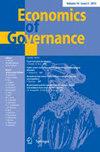Step-by-step group contests with group-specific public-good prizes
IF 0.8
4区 经济学
Q3 ECONOMICS
引用次数: 0
Abstract
The achievements reached by group members’ effort, which accompanies the possibility of members’ free-riding, affect the outcomes of competition among groups. In some cases, each achievement has the binary characteristic of “one or nothing.” For example, research groups face the challenge of making a scientific finding or not. The groups compete for a scientific breakthrough by making the related findings in a “step-by-step” manner. One finding could fail because of a mistake caused by a slight lack of effort by one member. Such a characteristic of “one or nothing” motivates group members without any incentive scheme. This study analyzes group contests with group-specific public-good prizes, in which we introduce a step function with the characteristics of “one or nothing” and “step-by-step” as a group impact function. We show the existence of the Nash equilibrium at which no group member free-rides on the others and at which more achievements than those reachable by a single member are reached.分步骤开展小组竞赛,并颁发针对特定小组的公益奖品
群体成员努力所取得的成就,伴随着成员搭便车的可能性,影响着群体间竞争的结果。在某些情况下,每项成就都具有 "非此即彼 "的二元特征。例如,研究小组面临着是否能取得科学发现的挑战。各小组通过 "循序渐进 "的方式取得相关发现,争夺科学突破。一个发现可能因为某个成员稍不努力而导致失误,从而失败。这种 "不成功便成仁 "的特点在没有任何激励计划的情况下也能调动小组成员的积极性。本研究分析了有团体特定公益奖品的团体竞赛,其中我们引入了一个具有 "一无 "和 "逐步 "特征的阶跃函数作为团体影响函数。我们证明了纳什均衡的存在,在这种均衡中,没有任何一个小组成员可以免费搭乘其他人的顺风车,而且所取得的成就比单个成员所能取得的成就还要多。
本文章由计算机程序翻译,如有差异,请以英文原文为准。
求助全文
约1分钟内获得全文
求助全文
来源期刊

Economics of Governance
ECONOMICS-
CiteScore
1.50
自引率
0.00%
发文量
22
期刊介绍:
Economics of Governance aims to foster research on governance at many levels: corporations, non-profit organizations, local and federal governments, and international organizations. Applications include the internal organization of firms, corporate governance, the private provision of public goods, local public policies, relations across levels of government, public expenditure and regulation, and problems of credibility and enforcement of international agreements. Though the journal aims to contribute to general economic knowledge, it is also interested in applying theoretical and empirical insights to important current topics. The journal is open to many approaches, including formal theoretical analysis, systematic observation, simulation, and empirical studies. Interdisciplinary contributions by economists, organizational scholars, and political scientists are encouraged.
Officially cited as: Econ Gov
 求助内容:
求助内容: 应助结果提醒方式:
应助结果提醒方式:


